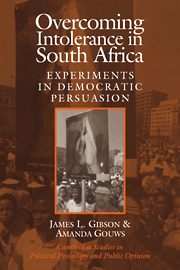Crossref Citations
This Book has been
cited by the following publications. This list is generated based on data provided by Crossref.
Gouws, Amanda
and
Gibson, James L.
2001.
The study of political tolerance in the South African context.
Social Dynamics,
Vol. 27,
Issue. 2,
p.
109.
Gibson, James L.
Caldeira, Gregory A.
and
Spence, Lester Kenyatta
2002.
The Role of Theory in Experimental Design: Experiments Without Randomization.
Political Analysis,
Vol. 10,
Issue. 4,
p.
362.
Peffley, Mark
and
Rohrschneider, Robert
2003.
Democratization and Political Tolerance in Seventeen Countries: A Multi-level Model of Democratic Learning.
Political Research Quarterly,
Vol. 56,
Issue. 3,
p.
243.
Gibson, James L.
2003.
The Legacy of Apartheid.
Comparative Political Studies,
Vol. 36,
Issue. 7,
p.
772.
Gibson *, James L.
2004.
Overcoming apartheid: can truth reconcile a divided nation?.
Politikon,
Vol. 31,
Issue. 2,
p.
129.
Silbey, Susan S.
2005.
AFTER LEGAL CONSCIOUSNESS.
Annual Review of Law and Social Science,
Vol. 1,
Issue. 1,
p.
323.
Weldon, Steven A.
2006.
The Institutional Context of Tolerance for Ethnic Minorities: A Comparative, Multilevel Analysis of Western Europe.
American Journal of Political Science,
Vol. 50,
Issue. 2,
p.
331.
García-Rivero, Carlos
2006.
Race, Class and Underlying Trends in Party Support in South Africa.
Party Politics,
Vol. 12,
Issue. 1,
p.
57.
Curry, Jane L.
2007.
When an Authoritarian State Victimizes the Nation: Transitional Justice, Collective Memory, and Political Divides.
International Journal of Sociology,
Vol. 37,
Issue. 1,
p.
58.
Bratton, Michaël
2007.
Populations pauvres et citoyenneté démocratique en Afrique.
Afrique contemporaine,
Vol. n° 220,
Issue. 4,
p.
33.
Transue, John E.
2007.
Identity Salience, Identity Acceptance, and Racial Policy Attitudes: American National Identity as a Uniting Force.
American Journal of Political Science,
Vol. 51,
Issue. 1,
p.
78.
Schildkraut, Deborah J.
2007.
Defining American Identity in the Twenty-First Century: How Much “There” is There?.
The Journal of Politics,
Vol. 69,
Issue. 3,
p.
597.
McClain, Paula D.
Johnson Carew, Jessica D.
Walton, Eugene
and
Watts, Candis S.
2009.
Group Membership, Group Identity, and Group Consciousness: Measures of Racial Identity in American Politics?.
Annual Review of Political Science,
Vol. 12,
Issue. 1,
p.
471.
Bradshaw, Gavin
2011.
Sortie de conflit et cohésion sociale : douze années d'histoire de l'Afrique du Sud.
Revue internationale des sciences sociales,
Vol. n° 192,
Issue. 2,
p.
203.
Djupe, Paul A.
and
Calfano, Brian R.
2013.
Divine Intervention? The Influence of Religious Value Communication on U.S. Intervention Policy.
Political Behavior,
Vol. 35,
Issue. 4,
p.
643.
Charnysh, Volha
Lucas, Christopher
and
Singh, Prerna
2015.
The Ties That Bind.
Comparative Political Studies,
Vol. 48,
Issue. 3,
p.
267.
Widmalm, Sten
2016.
India's Democracies.
p.
223.
EKER, Semih
and
EKER, Melek
2017.
Higher Education and Democratic – Libertarian Attitude: An Evidence from Turkey.
ISGUC The Journal of Industrial Relations and Human Resources,
p.
5.
Silbey, Susan S.
2018.
After Legal Consciousness.
Droit et société,
Vol. N° 100,
Issue. 3,
p.
571.
Buyuker, Beyza
and
Filindra, Alexandra
2019.
Echoes of the 'White Republic': Racial Prejudice, Xenophobia and the Erosion of Democracy in the United States.
SSRN Electronic Journal ,





